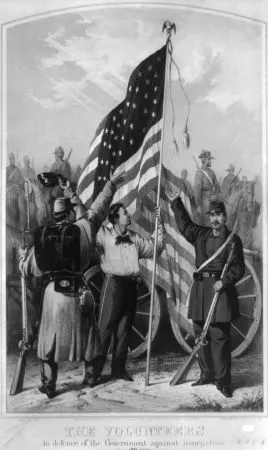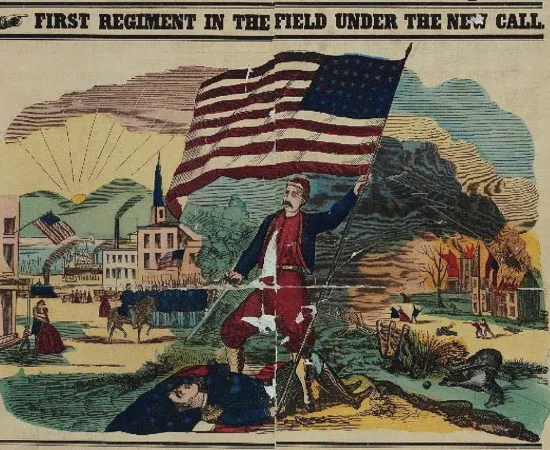
By Samantha Payne
Abraham Lincoln’s Gettysburg Address began with the words, “Four score and seven years ago, our fathers brought forth on this continent, a new nation, conceived in Liberty, and dedicated to the proposition that all men are created equal.” By invoking the memory of the American Revolution, Lincoln reminded the nation why men fought—so that “government of the people, by the people, and for the people, shall not perish from the earth.”
Lincoln’s emphasis on the Revolution reflected widely held beliefs. Men from the North and South went to war to decide the fate of republican government.

Soldiers on both sides claimed the legacy of the American Revolution. In Ohio, Lucien Warner enlisted on April 20, 1861, in order to “protect and preserve the liberties of this country.” Soldiers felt that liberty was their inheritance from America’s founders. One Union soldier explained that he fought for “the blessings bought by the blood and treasure of our Fathers.”
Confederate volunteers shared this devotion to their revolutionary heritage. In early 1861, Phifer Erwin of North Carolina enlisted to serve on the “side of liberty” in defense of “the rights of men.” His father congratulated him, explaining that “those who now take sides against us will before long be treated as the Tories were in the Revolution.”
Men from the North and the South interpreted the same history in different ways. Northern soldiers believed that “the liberty of the world” depended on the survival of the Union. The Revolution had created a united nation and a single government. As one New York lieutenant saw it, “constitutional liberty cannot survive the loss of unity in government.” Northern volunteers perceived the Union as a “beacon light of liberty & freedom to the human race,” without which, “all the hope and confidence of the world in the capacity of men for self-government will be lost.” These men deeply feared the consequences of Confederate independence. One Connecticut soldier wrote that if the North lost the war, a “long night of tyranny” would surely follow.

Southern soldiers believed they were fighting the second war of independence. Southerners continually compared Northerners to the British. On July 4, 1862, James Patton declared that the “wrongs complained of by our revolutionary fathers,” seemed trifling when measured against “the terrible system of oppression instituted by the Yankees.” Others looked to the founders for inspiration. One Confederate Kentuckian reflected on George Washington’s “example in bursting the bonds of tyranny,” and felt proud to carry on the fight for the “priceless rights…obtained by our forefathers.”
Similarly, Confederates found solace in their memory of American soldiers in the revolution. Disheartened by the defeat at Vicksburg, one Georgia captain comforted himself by recalling that “our forefathers were whipped in nearly every battle…yet after seven years of trials and hardships, achieved their independence.” With renewed determination, he wrote, “we must put forth even greater energy—resolve more fully to conquer or die.”
The historian James McPherson argues that Union and Confederate soldiers’ deeply personal, ideological convictions drove them to leave home, brave combat, and face death for four bloody and arduous years. The clash between North and South was the struggle to uphold—and define—the ideals of the American Revolution.
As the soldier Sullivan Ballou wrote to his wife on July 14, 1861, “I know how strongly American Civilization now leans on the triumph of the Government and how great a debt we owe to those who went before us through the blood and sufferings of the Revolution. And I am now willing—perfectly willing—to lay down all the joys in this life, to help maintain this Government, and to pay that debt.” Leading his men into battle a week later, he was struck by a shell fragment and killed.





